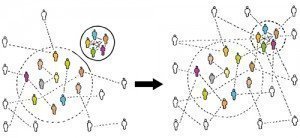
Connections are important. Whether we are connecting with friends, family, colleagues, or potential new business, it's human nature to form “ties.” Ties can be defined as the interconnectedness of your social network. Personal network and professional network combined, your social network is everyone in your life who you are connected to; everyone in your life who you have ties with.
Just like it’s human nature to form these ties, its also human nature to put a greater amount of focus on strong ties: ties that are deep connections with people who can greatly benefit you. We are taught early in our professional career to form strong ties with thought leaders in our industry, our industry colleagues, and our industry peers.
What better way to get ahead than to build out a network that resembles the rungs of a ladder? Constantly moving up, they say.
Strong ties are great. They allow you to entrench yourself within a chosen career path, and allow you to collaborate with people who have deep respect for you. Strong ties have helped cofounders start some of the most successful companies on the planet and have helped professionals all over the globe get ahead. It’s all about who you know, ya know?
But in the same vein as my last post on the benefit of knowledge vs naiveté, what if I told you that weak ties were just as important as strong ties, if not more so?
Weak ties, although they don’t necessarily build the deep trust that comes along with strong ties, give us an interconnected worldview and allows us to connect the dots between different industries. They also give us a new perspective to look at our own industry.
Since strong ties are deep connections with people who can greatly benefit you, weak ties can be defined as connections that may not be directly beneficial, but are mentally stimulating and cause us to look at the world with fresh eyes. Weak ties, as important as strong ties, can directly affect your thought process, which in turn effects your creativity, innovation, and ultimately your success and happiness.
 If you were in the tech sector, an example of a strong tie would be your mentor, who is the CEO of a tech startup. An example of a weak tie would be the friend of a friend who runs an educational non-profit. You can inherently see how your CEO mentor is an important strong tie; your current career path will be directly benefitted by having him in your people network.
If you were in the tech sector, an example of a strong tie would be your mentor, who is the CEO of a tech startup. An example of a weak tie would be the friend of a friend who runs an educational non-profit. You can inherently see how your CEO mentor is an important strong tie; your current career path will be directly benefitted by having him in your people network.
The importance of your weak tie is a little harder to see, but is just as impactful. Although you may not be interested in an education non-profit, maybe you find out that it’s an underserved market for tech. Maybe there is a product or service that you can create around your interaction with this weak tie.
Martin Ruef, a sociologist at Princeton, has investigated the impact of weak ties, and his findings - by now - shouldn’t surprise you. Ruef began his investigation by interviewing 776 graduates of Stanford Business School, all of whom had gone on to become entrepreneurs. He wasn’t interested in their business acumen, however. He was interested in their social networks. What he found was that most of them had normal social networks comprised of strong ties with like-minded people.
“This isn’t particularly surprising,” Ruef reflects, “we all naturally self-segregate, choosing to spend time with people who are just like ourselves.”
But, he discovered that a small subset of the entrepreneurs he interviewed had cultivated a social network filled with weak ties and unlikely relationships. These entrepreneurs were the types of people who chatted with industry professionals and random strangers at Starbucks alike, putting importance on each type of tie. Ruef then looked into what he determined as a barometer of innovation - trademarks and patents - and found that entrepreneurs with social networks full of weak ties were three times more innovative than people with networks filled with strong ties.
If this doesn’t make you think, you obviously weren’t reading it. Turn off that YouTube video!
What Marin Ruef’s study shows us is that weak ties in our social network are important, almost exclusively so. Weak ties, much like knowledge and naiveté, open our eyes and expand our world view; they not only help us connect the dots, but give us the dots to connect. A social network filled with strong ties give us a web of support, and the addition of weak ties to our social network give us increased creativity, more innovation, and a stronger sense of happiness and purpose.
Hey, your net worth is directly tied to your network. It’s never too soon to start talking to the person behind you at Starbucks (Sorry San Franciscans, insert name of your locally owned organic coffee shop here).
Takeaways
- Strengthen your network with weak ties
- We place high value on strong-ties, but we should also be cultivating weak-ties
- While strong ties give us a sense of support, weak ties give us creativity and innovation
- Remember: your net worth is directly tied to your network; start talking to random people now!